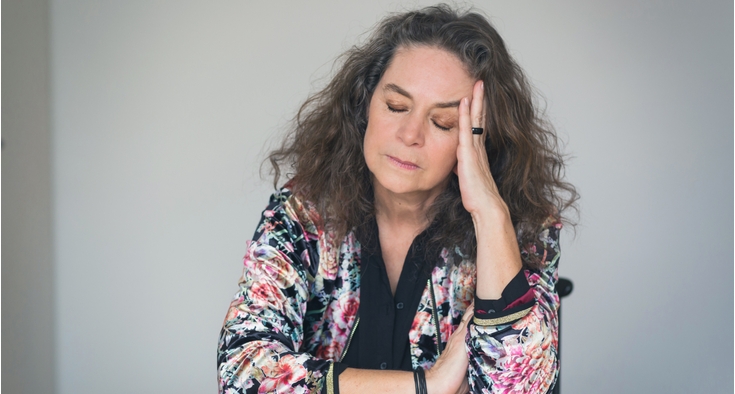By Emily Gibbs, Novant Health Healthy Headlines
To find and book a physician click here.
A woman’s body has the ability to do some incredible things throughout a lifetime. And endure some difficult changes. One of those challenges is the dreaded ‘M’ word – menopause. Menopause marks the end of a monthly menstruation or period. It’s followed by symptoms that are not easy to deal with, particularly when trying to be productive in the workplace.

We had the opportunity to sit down with obstetrician-gynecologist Dr. Lee Ann Garner at Novant Health Glen Meade OB/GYN to talk through symptoms, ways to manage the change and how to keep the very important conversation about menopause going.
As it happens, the FDA just approved a new drug, Veozah to treat moderate to severe hot flashes caused by menopause. Garner said she’ll definitely be prescribing it once it’s on the market.
Q. What is menopause?
Menopause is a clinical diagnosis, and it’s when a woman stops having a menstrual cycle for at least 12 months.
Q. At what age do most women start to experience menopause and how long does it last?
You can start perimenopause in your 40s, but on average, women in the U.S. complete the process by 51 or 52. Menopause can last anywhere from five to 30 years. I have some patients in their 80s who are still experiencing symptoms.
Q. Does everyone experience menopause?
All women stop having their periods eventually. There are some women who are lucky enough to not have significant symptoms.
Q. What are the most common symptoms you see?
The most common symptom, hands down, is hot flashes and that’s one of the easiest ones to fix, thankfully. The other ones would be fatigue and trouble sleeping. Brain fog is very common, as well as mood disturbance. Mood disturbance is commonly one of the first ones you notice even before the period starts to change. Others include vaginal dryness, painful intercourse and low libido – to name a few, but there are many others.
Q. You mentioned perimenopause – how is that different from menopause?
So just like menopause, perimenopause is also a clinical diagnosis. If any of those normal menopause symptoms start early – even if they’re hit or miss, like just once a month and your period is a little weird – then that’s usually a sign that perimenopause is starting.
It’s basically the ovaries just deciding to go a little crazy and they’re not ovulating consistently every 28 days. They’re not producing the normal amounts of hormones all the time. They’re just doing this sputter thing where one month they do a lot, and the other, they do a little. And that’s the reason we have symptoms. Our hormones are literally all over the place during that time. A common misconception is that this is something that we can diagnose with lab work, but it’s not. It’s all about tracking your symptoms and tracking your menstrual cycle.
Q. What’s the earliest you’ve seen perimenopause begin?
I mean, I’ve had patients in their 20s. This is obviously an abnormally early time to start perimenopause or menopause. The average age I see most patients start to talk about it is typically in the mid-40s.
Q. What do you usually suggest to alleviate symptoms?
There’s a lot that you can do from a conservative management standpoint, and it really just aims at being healthy. All the things that we preach for the other decades in life hold true for menopause and perimenopause time as well. Regular exercise can alleviate hot flashes, specifically things like yoga and meditation.
Unfortunately, there are not any supplements that have been proven to be extremely helpful, other than just a healthy diet and exercising. I do recommend a Mediterranean style diet.
Q. Can anything else make symptoms worse?
Alcohol can actually can be a huge trigger for hot flashes and some of the mood and sleep disturbances.
Q. Some consider getting hormone replacement therapy, is that something that you usually recommend?
Yeah, it’s a great option if you’re someone who is a good candidate for that. I’m a big fan of hormones. I feel like they have unfortunately gotten a lot of negative press starting about 20 years ago, when the Women’s Health Initiative’s initial studies came out. A lot of that data has been basically overturned and reworked and restudied. So there’s overwhelming evidence now that supports the safety of hormones.
Generally estrogen works the best to control most menopause symptoms. Testosterone can also be added in safe, smaller doses if done properly. Estrogen creams can be very helpful as well, specifically vaginal estrogen. Vaginal estrogen is extremely important for really all women, even those who don’t have severe menopause symptoms.
Those are the hormonal types of medications, but there are actually some other medications that can be helpful for symptoms as well that are non-hormonal. I council the patients on the pros and cons of both, and then I’ll let them decide based on the severity of their symptoms and their family history.
Q. Should we be tracking our symptoms?
Sure! Journaling is great for really anything symptom-wise, because it takes it takes symptoms that are very subjective and it can help to make them more objective. This can help track if new therapies or treatments or lifestyle changes are working. Certainly, we should all be tracking our menstrual cyclesand that’s a huge indicator if it starts to become more irregular or heavier. I usually tell patients just to get a blank calendar and write headache or write hot flash and journal a little bit each day just to see how bad their symptoms are.
Q. A new Mayo Clinic study came out that talks a lot about how menopause is interfering with women in the workplace. Is there anything women can do?
Yes, talking with your doctor is important because there are so many options for treatment now. Brain fog is such an issue especially for professional women during this time. And you know, a lot of it is due to lack of sleep and mood disturbance. We’re not really sure exactly what drives brain fog, but it can certainly affect your performance at work. Thankfully, there are lots of studies that show once the menopause transition is over, brain fog goes away. Certainly consider talking to your doctor to add some possible pharmaceutical options in there to help.
Q. When should someone bring up brain fog to their doctor?
I think when others are noticing the brain fog and are mentioning it in their day-to-day life. If you feel like you’re struggling with your daily activities and your ability to function in life and in your career, that’s a great time to bring it up. Or just if you’re just worried about it, it’s an easy discussion to have.
Q. Would you say it’s important for employers to acknowledge this and understand some of their women employees may struggle with brain fog?
Yes! I think the whole world needs to acknowledge menopause more. You know, for some reason this is a time that is “hush-hush” and not talked about. When I ask women, when did your mom go through menopause? When did your grandma or your sister go through menopause? They say, “Well, I don’t know, it’s not something we really discussed and talked about.” It’s unfortunate women of this age often sweep it under the rug, and their issues are not really brought to the forefront like they should be. So certainly, this needs to be a focus.
Q. How do you see menopause affecting women’s sex lives?
Menopause can greatly affect libido and the ability to have pain-free sex. There are many options for treatment which involve hormonal therapy, sex therapy and couple’s therapy. This is something best treated by an OB/GYN who has had training in the field. Be careful of wellness clinics promoting high dose hormones given by practitioners not adequately trained in the field of women’s sexual health.
Q. Is there anything else women can prepare for when it comes to menopause?
Yes, just having knowledge about what this is and what to look for and what you can do. There are several books that I like to recommend for women to consider reading in their 40s. I think women should have the knowledge about what the options are and what the symptoms look like. That would be my recommendation and again, a healthy lifestyle. We preach it all the time, you know, but it really does work. It requires a lot of fortitude, because it’s every day that you’re supposed to do these things, but that really does help.
Q. Last but not least, what should men know about menopause?
I think it’s important to be supportive of our partners and our family members and understanding that it can be a difficult time for all of us. Also, not making comments and not judging harshly. I’ve heard many stories that I think can certainly set us off a little.
Also men just need to be knowledgeable about this, right? You may have daughters, right? You may have sisters and a mother. I mean, we all need to be aware of these things, because women are everywhere.
Novant Health
Healthy Headlines
Facebook
Instagram
Twitter
YouTube




